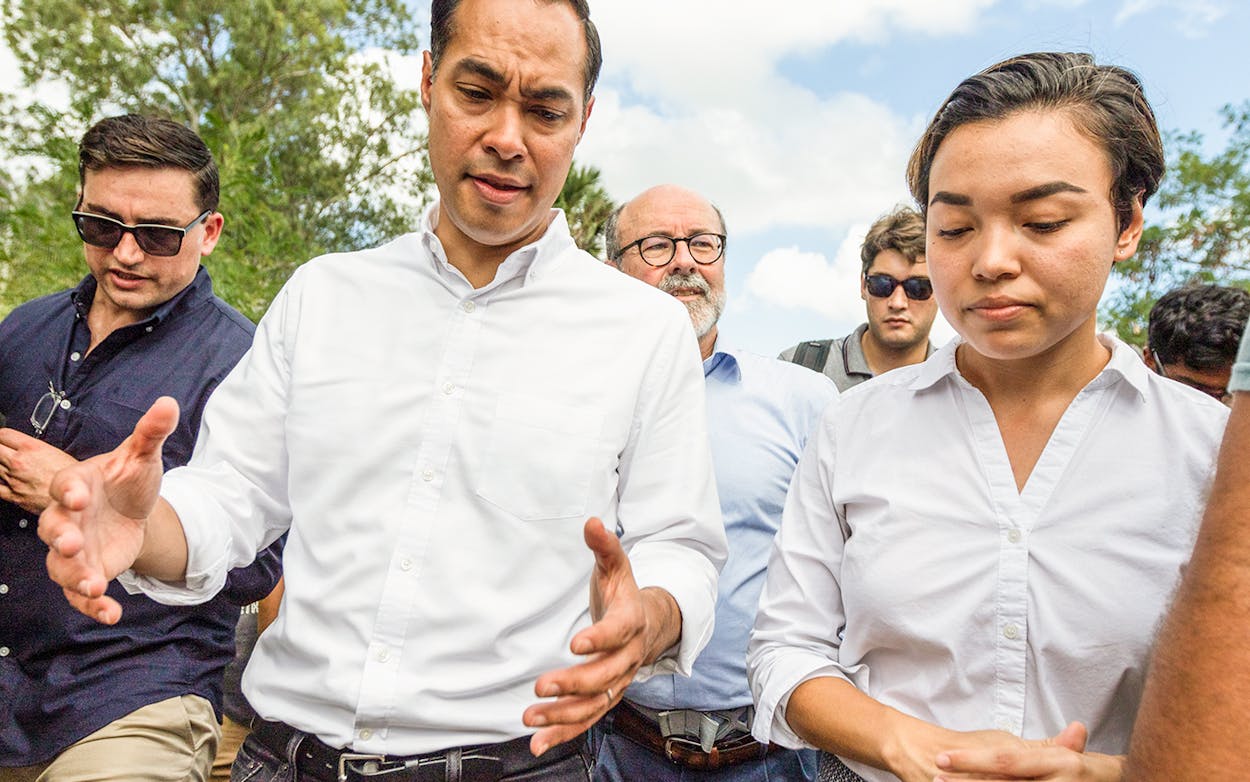At this point, Julián Castro’s path to the Democratic presidential nomination is hard to imagine. It’s been a three- to five-person race since April, with Elizabeth Warren, Joe Biden, and Bernie Sanders leading the field and Pete Buttigieg and Kamala Harris waxing and waning in relevance as voters look beyond the trio of septuagenarians atop the field. Castro, who announced his campaign in early January, has never been among the race’s leaders.
Until last night, though, he’d always at least been on the stage with them. At the fifth Democratic debate, the field had winnowed to candidates who had reached at least 3 percent in four national polls (or 5 percent in two early-state polls), and who’d managed to secure fund-raising support from 165,000 individual donors. Tom Steyer and Andrew Yang, neither of whom has ever worked in government, got there. So did Tulsi Gabbard, a fourth-term congresswoman from Hawaii. Buttigieg, who’s managed to become an unlikely front-runner despite serving only as the mayor of the Indiana college town of South Bend (which, were it in Texas, would be the forty-first largest city in the state), was never in question. But Castro, who served two terms as the mayor of San Antonio—fifteen times the size of South Bend—before joining the Obama administration as secretary of Housing and Urban Development, did not.
That’s on Castro and his campaign, and their inability to connect with enough voters to meet requirements that ten other candidates did. But Castro was nonetheless conspicuous in his absence. In the days before the debate, observers began to consider what the Democratic primary lost by not having Castro and his plain-speaking, confrontational voice in the room. Rolling Stone, Esquire, and Politico all published laments that the outspoken candidate wouldn’t be around to challenge his rivals.
Castro, for his part, didn’t take the exclusion as a sign that his campaign is over. Other candidates spent the debate tweeting jokes (Marianne Williamson posted, “Miss me?” and it’s unclear if anyone did) or sharing photos of themselves with fives of supporters in Iowa. Instead, he responded to every question on Twitter, leading his name to trend on the social media app despite not being on anyone’s television that night.
Every person who wants an abortion should be able to get one.
— Julián Castro (@JulianCastro) November 21, 2019
That’s it. That’s the tweet.#JuliánDebates #DemDebate
More Americans are sleeping on the street than before Trump took office.
— Julián Castro (@JulianCastro) November 21, 2019
Communities across the country are experiencing an affordable housing crisis.
Our neighborhoods are still segregated.
I'm glad there was finally a housing question at tonight's #DemDebate.#JuliánDebates pic.twitter.com/UQ97xmTYKX
Castro also appealed to followers to help raise money for his campaign, which would help him meet the more stringent fund-raising qualifications for December’s debate—and his press secretary, Sawyer Hackett, says the appeal led to the most successful fund-raising day of the month.
A good day of fund-raising won’t necessarily translate to increased poll support, but it serves as a reminder that he’s in a different spot than most of the candidates who haven’t qualified for the debates, such as Senator Michael Bennet of Colorado and Montana governor Steve Bullock. Those candidates seem to be idling, counting on their personalities to catapult them to relevancy. Castro, on the other hand, is relentlessly focused on issues ignored or downplayed by almost everyone else in the field. For example, Castro went to Georgia, where the debate was held, to talk about housing issues with citizens. Charlie Pierce, reporting for Esquire, wrote about Castro’s listening tour of DeKalb County:
Castro spent most of the morning listening to Gabriel and to the other people who are trying to save their neighborhood. He spoke about those days as mayor of San Antonio and about how simply chasing a bunch of corporate headquarters is not the way to build a livable city. “Every day,” Castro said, “it seems like I read about another corporation relocating its headquarters to Atlanta, and that’s a good thing for Atlanta. But it seems to me that we have to develop a holistic way of going about it. What will this new company, and the jobs that come with it, mean for a city’s housing, its traffic, or its educational system? We need a holistic way of urban development that takes into account the lives of the people who are already there.”
As a former big-city mayor and HUD secretary, Castro is of course uniquely qualified to talk about housing. But his policy interests don’t stop there. He’s also advancing a wide range of other issues that haven’t been central to Democratic politics in the past—everything from indigenous rights to animal welfare to strengthening protections for domestic workers. You’re going to struggle to find another candidate whose “issues” page on their website leads with “Equality for People with Disabilities.” But the fact that Castro’s off-script agenda hasn’t helped him in the polls reveals a paradox in the 2020 Democratic primary.
The Democratic debate is better, the party stronger, if its candidates are talking about the sort of issues that only Castro seems interested in talking about. But introducing those issues doesn’t necessarily get him on the stage. Still, a campaign isn’t just about landing at the top of the ticket on election day. Losing candidates have shaped the direction of their party—and also found themselves in the running for vice president, which is a job Castro might be on an extended interview for right now. The longer he’s able to keep himself in the conversation, and the more his absence makes an impression, the better he’s able to remind voters, the press, and his fellow candidates that he has something to say. That will ultimately serve him, and the primary debate, even if it doesn’t bring him much closer to being the nominee.
- More About:
- Politics & Policy
- Julian Castro








